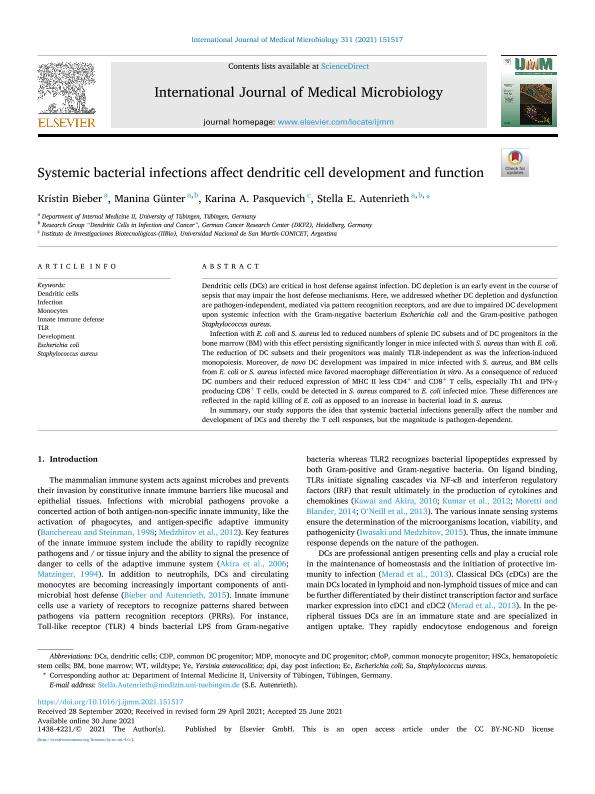Mostrar el registro sencillo del ítem
dc.contributor.author
Bieber, Kristin
dc.contributor.author
Günter, Manina
dc.contributor.author
Pasquevich, Karina Alejandra

dc.contributor.author
Autenrieth, Stella E.
dc.date.available
2023-01-13T16:58:34Z
dc.date.issued
2021-08
dc.identifier.citation
Bieber, Kristin; Günter, Manina; Pasquevich, Karina Alejandra; Autenrieth, Stella E.; Systemic bacterial infections affect dendritic cell development and function; Elsevier Gmbh; International Journal of Medical Microbiology (print); 311; 6; 8-2021; 1-10
dc.identifier.issn
1438-4221
dc.identifier.uri
http://hdl.handle.net/11336/184702
dc.description.abstract
Dendritic cells (DCs) are critical in host defense against infection. DC depletion is an early event in the course of sepsis that may impair the host defense mechanisms. Here, we addressed whether DC depletion and dysfunction are pathogen-independent, mediated via pattern recognition receptors, and are due to impaired DC development upon systemic infection with the Gram-negative bacterium Escherichia coli and the Gram-positive pathogen Staphylococcus aureus. Infection with E. coli and S. aureus led to reduced numbers of splenic DC subsets and of DC progenitors in the bone marrow (BM) with this effect persisting significantly longer in mice infected with S. aureus than with E. coli. The reduction of DC subsets and their progenitors was mainly TLR-independent as was the infection-induced monopoiesis. Moreover, de novo DC development was impaired in mice infected with S. aureus, and BM cells from E. coli or S. aureus infected mice favored macrophage differentiation in vitro. As a consequence of reduced DC numbers and their reduced expression of MHC II less CD4+ and CD8+ T cells, especially Th1 and IFN-γ producing CD8+ T cells, could be detected in S. aureus compared to E. coli infected mice. These differences are reflected in the rapid killing of E. coli as opposed to an increase in bacterial load in S. aureus. In summary, our study supports the idea that systemic bacterial infections generally affect the number and development of DCs and thereby the T cell responses, but the magnitude is pathogen-dependent.
dc.format
application/pdf
dc.language.iso
eng
dc.publisher
Elsevier Gmbh

dc.rights
info:eu-repo/semantics/openAccess
dc.rights.uri
https://creativecommons.org/licenses/by-nc-nd/2.5/ar/
dc.subject
DENDRITIC CELLS
dc.subject
DEVELOPMENT
dc.subject
ESCHERICHIA COLI
dc.subject
INFECTION
dc.subject
INNATE IMMUNE DEFENSE
dc.subject
MONOCYTES
dc.subject
STAPHYLOCOCCUS AUREUS
dc.subject
TLR
dc.subject.classification
Inmunología

dc.subject.classification
Medicina Básica

dc.subject.classification
CIENCIAS MÉDICAS Y DE LA SALUD

dc.title
Systemic bacterial infections affect dendritic cell development and function
dc.type
info:eu-repo/semantics/article
dc.type
info:ar-repo/semantics/artículo
dc.type
info:eu-repo/semantics/publishedVersion
dc.date.updated
2022-09-20T11:06:50Z
dc.journal.volume
311
dc.journal.number
6
dc.journal.pagination
1-10
dc.journal.pais
Alemania

dc.journal.ciudad
Berlín
dc.description.fil
Fil: Bieber, Kristin. University Of Tübingen; Alemania
dc.description.fil
Fil: Günter, Manina. University Of Tübingen; Alemania. German Cancer Research Center; Alemania
dc.description.fil
Fil: Pasquevich, Karina Alejandra. Universidad Nacional de San Martín. Instituto de Investigaciones Biotecnológicas. - Consejo Nacional de Investigaciones Científicas y Técnicas. Oficina de Coordinación Administrativa Parque Centenario. Instituto de Investigaciones Biotecnológicas; Argentina
dc.description.fil
Fil: Autenrieth, Stella E.. University Of Tübingen; Alemania. German Cancer Research Center; Alemania
dc.journal.title
International Journal of Medical Microbiology (print)

dc.relation.alternativeid
info:eu-repo/semantics/altIdentifier/url/https://linkinghub.elsevier.com/retrieve/pii/S1438422121000461
dc.relation.alternativeid
info:eu-repo/semantics/altIdentifier/doi/http://dx.doi.org/10.1016/j.ijmm.2021.151517
Archivos asociados
